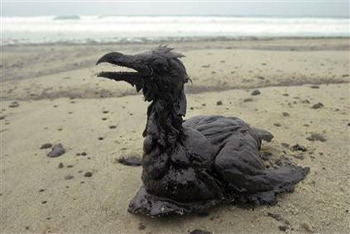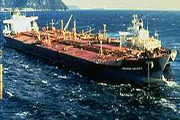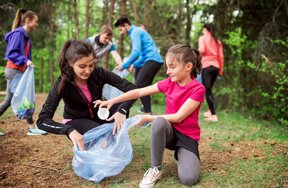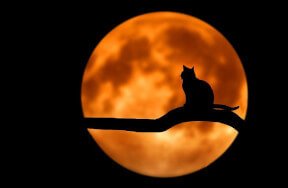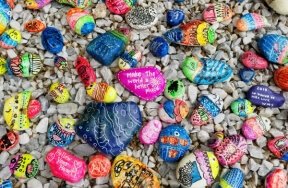Imagine you’re a killer whale. You’re swimming round when you decide to stick your head out of the water to take a breath. When you do, you see a large stream of thick black oil heading your way. You go back underwater only to find other animals dying because the oil is damaging their bodies. This is the way some animals die in the ocean – because of an oil spill in their habitat.
What’s an oil spill?
Oil spills happen when people make mistakes or are careless and cause an oil tanker (a ship that carries oil from one country or place to another) to leak oil into the ocean. Or, when countries are at war, one may decide to dump gallons of oil into the other country’s oceans.
 A leaking oil tanker causes an oil spill in the ocean
A leaking oil tanker causes an oil spill in the ocean
Illegal dumpers dump crude oil into the ocean because they don’t want to spend money on decomposing their waste oil. This is illegal. Natural disasters (like hurricanes) may cause an oil spill, too, by flipping an oil tanker over, causing oil to come pouring out. But don’t be fooled: mostly, oil spills are caused by humans.
How do oil spills affect animals?
Birds die from oil spills if their feathers are covered in oil. When they try to clean their feathers, they’re poisoned. Animals may die because they get hypothermia, causing their body temperature to be really low. Oil can also enter an animal’s lungs or liver, poisoning it from the inside. Oil also blinds animals when it gets into their eyes, so they can no longer watch out for predators.
 Sea birds get poisoned by oil spills
Sea birds get poisoned by oil spills
Sea otters’ bodies may get covered in oil, which causes buildup in the air bubbles located in their fur, which are specially designed to help them survive the cold oceans and help them to float. When oil builds up in the air bubbles, the otters may die of low body temperature.
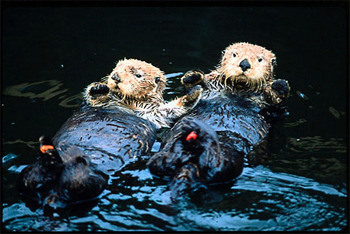 These two sea otters are covered in oil from a spill
These two sea otters are covered in oil from a spill
Oil spills are also a major reason that killer whales are endangered. The oil may be eaten or enter the whale’s blowhole. A blowhole is a hole to help them breath. Whales will rise up over the water to take a breath. If the blowhole is plugged with oil, the whale can’t breathe! Or, if a whale eats a fish that swam through oil, it will be poisoned and then die.
All the animals in the ocean
Many people don’t realize all the creatures in the ocean that oil spills affect. Plankton, larval fish and bottom-dwelling organisms, and even seaweed, clams, oysters and mussels can be affected by oil spills. When hundreds of plankton die because of oil, fish don’t have enough food to eat, which will cause them to die. If the fish die, there won’t be enough food for whales, and they will die, too. As you can see, oil spills can damage the entire food chain in one blow.
 Seals that swim in the ocean are killed by oil spills
Seals that swim in the ocean are killed by oil spills
Helping animals after a spill
There are many ways that animals are cleaned up after an oil spill. When birds arrive at a cleaning center, the oil is flushed from their eyes and intestines and they’re examined for broken bones, cuts and other injuries. Next, they get a stomach-coating medicine to prevent any more oil from entering their systems. They are then warmed and placed in a quiet area where they’re fed and kept safe until they are healthy enough to be returned to the wild.
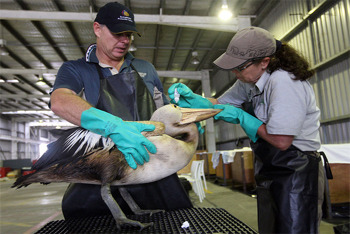 Cleaning a sea bird affected by an oil spill
Cleaning a sea bird affected by an oil spill
When sea otters are taken to a cleaning facility, they’re washed with warm water to (hopefully) break down the oil and warm the otters up. The otters also get medical treatment while they are being cleaned. After their fur is dry, they have to stay a few more days so the workers are sure of no diseases or broken bones.
 Cleaning a sea otter affected by an oil spill
Cleaning a sea otter affected by an oil spill
Helping and saving sea life today
Have you ever stopped to think what you use oil for? Everyone uses oil a lot. The whole world uses nearly three billion gallons of oil every day to fuel our cars, trucks buses, and even to heat our homes. If you have touched a chain on a bicycle, you have touched some oil. The black stuff that appears on your fingers is oil that makes the chains on your bike run smoothly. We use oil to make asphalt to pave our roads and highways. Oil is also made into plastics, which in turn are used to make your toys, games and MP# players. Oil is also used in medicines, ink, paints and to create some electricity.
We can all help stop oil spills from occurring. If you use less oil, then less will have to be transported by tanker across the ocean. How can you use less oil? Leave your car at home and walk or ride a bike instead. Something a city can do is decide to pave its roads with cement instead of asphalt – cement does not use oil the way asphalt does.
 Save energy, save oil, prevent oil spills
Save energy, save oil, prevent oil spills
Think about how many lights you have in your house, as well as all the electronics like computers or TVs. All of these things use electricity. If we all were to turn off lights, computers and televisions when we’re not using them, we wouldn’t be using as mush oil to create the electricity throughout the house. If everyone around the world decided to use less oil, we would lower the risk of a large spill, like the one that recently happened in the Gulf of Mexico.
Video: Oil Spill
Have Your Say
If this story makes you sad, do something about it! Do you have any ideas on how we can prevent another big oil spill from happening, and how we can use less oil in our everyday lives? Sound off in the Comments section below!
Related Stories:































